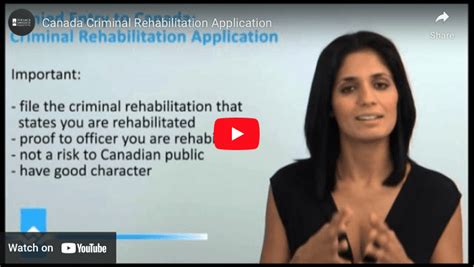Canada, known for its welcoming and inclusive environment, offers a second chance to individuals who have been convicted of a crime through the Criminal Rehabilitation application process. This process allows individuals to overcome their past mistakes and become eligible for entry into Canada. In this comprehensive guide, we will walk you through the steps and requirements necessary to apply for Criminal Rehabilitation in Canada.
What is Criminal Rehabilitation in Canada?
Criminal Rehabilitation is a process that allows individuals who have been convicted of a crime to demonstrate that they have been rehabilitated and are no longer a risk to Canadian society. This process is governed by the Immigration and Refugee Protection Act (IRPA) and is intended to provide a second chance to individuals who have learned from their mistakes and are committed to leading a law-abiding life.

Eligibility for Criminal Rehabilitation
To be eligible for Criminal Rehabilitation, you must meet certain criteria, including:
- You have been convicted of a crime that would render you inadmissible to Canada under the Immigration and Refugee Protection Act (IRPA).
- You have completed your sentence, including any probation or parole.
- You have a minimum of five years since the completion of your sentence.
- You are not a repeat offender.
- You are not a threat to Canadian society.
Types of Crimes Eligible for Criminal Rehabilitation
Not all crimes are eligible for Criminal Rehabilitation. The following types of crimes are typically eligible:
- Theft
- Assault
- Possession of narcotics
- DUI
- Traffic offenses
However, the following types of crimes are typically not eligible:
- Serious violent crimes, such as murder or aggravated assault
- Crimes against children
- Crimes involving the use of a firearm
- Crimes that resulted in serious bodily harm or death
The Application Process for Criminal Rehabilitation
The application process for Criminal Rehabilitation involves several steps:
- Determine your eligibility: Before applying, you must determine whether you are eligible for Criminal Rehabilitation. You can do this by consulting the Immigration and Refugee Protection Act (IRPA) and the Immigration and Refugee Protection Regulations (IRPR).
- Gather required documents: You will need to gather several documents, including:
- A copy of your conviction and sentence
- Proof of completion of your sentence, including any probation or parole
- Police certificates from the country where you were convicted and from any country where you have lived for the past five years
- A detailed personal statement outlining your rehabilitation and why you are no longer a risk to Canadian society
- Submit your application: Once you have gathered all the required documents, you can submit your application to the Canadian visa office responsible for your country of citizenship or residence.
- Pay the application fee: The application fee for Criminal Rehabilitation is currently CAD $631.
- Wait for processing: After submitting your application, you will need to wait for processing. This can take several months to several years, depending on the complexity of your case.

Required Documents for Criminal Rehabilitation
The following documents are required for a Criminal Rehabilitation application:
- Conviction and sentence: A copy of your conviction and sentence, including any court documents or records.
- Proof of completion of sentence: Proof of completion of your sentence, including any probation or parole records.
- Police certificates: Police certificates from the country where you were convicted and from any country where you have lived for the past five years.
- Personal statement: A detailed personal statement outlining your rehabilitation and why you are no longer a risk to Canadian society.
- Passport: A valid passport or travel document.
- Proof of language proficiency: Proof of language proficiency in English or French, such as a language test result.
Tips for a Successful Criminal Rehabilitation Application
To increase your chances of a successful Criminal Rehabilitation application, follow these tips:
- Hire a qualified immigration lawyer: A qualified immigration lawyer can help you navigate the complex application process and ensure that your application is complete and accurate.
- Be honest and transparent: Be honest and transparent about your past mistakes and provide detailed information about your rehabilitation.
- Provide detailed documentation: Provide detailed documentation, including police certificates and proof of completion of your sentence.
- Show rehabilitation: Show that you have been rehabilitated and are no longer a risk to Canadian society.

Conclusion
Criminal Rehabilitation in Canada offers a second chance to individuals who have been convicted of a crime. By following the steps and requirements outlined in this guide, you can increase your chances of a successful application. Remember to be honest and transparent about your past mistakes, provide detailed documentation, and show rehabilitation. With the help of a qualified immigration lawyer, you can navigate the complex application process and start a new life in Canada.
Gallery of Criminal Rehabilitation in Canada






FAQs
What is the difference between a Temporary Resident Permit (TRP) and Criminal Rehabilitation?
+A TRP is a temporary permit that allows you to enter Canada for a specific period, while Criminal Rehabilitation is a permanent solution that allows you to overcome your inadmissibility and become eligible for entry into Canada.
How long does the Criminal Rehabilitation application process take?
+The processing time for a Criminal Rehabilitation application can take several months to several years, depending on the complexity of your case.
Can I apply for Criminal Rehabilitation if I have multiple convictions?
+Yes, you can apply for Criminal Rehabilitation if you have multiple convictions, but you will need to provide detailed information about each conviction and demonstrate that you have been rehabilitated.
